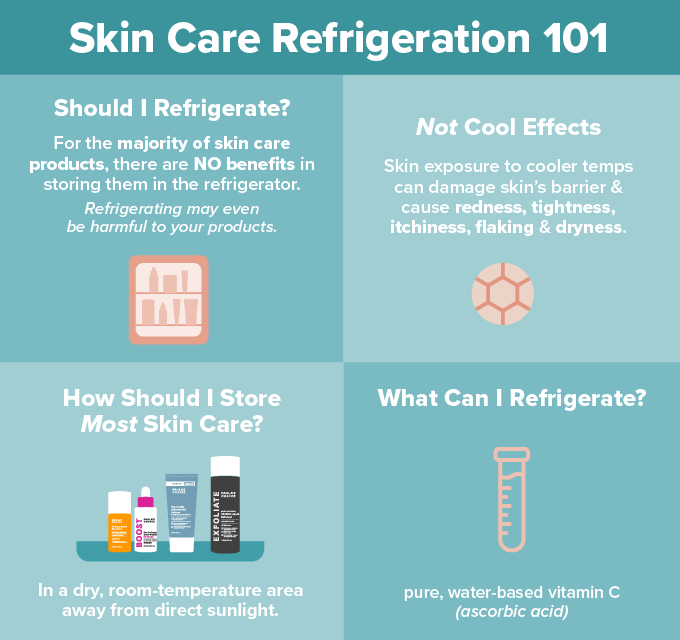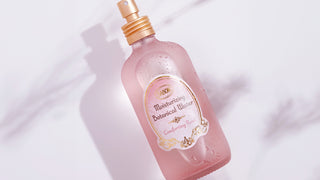Not all skincare products benefit from being kept in the fridge. Some items can lose their effectiveness or change texture when chilled.
Many people store their creams and serums in the refrigerator, thinking it will keep them fresh. While this works for some products, others may not react well to the cold. For example, certain oils and active ingredients can become unstable in low temperatures.
This can lead to reduced effectiveness or even irritation. Understanding which products should stay at room temperature is essential for maintaining healthy skin. This guide will help you identify the skincare items that should not be refrigerated. Keep reading to find out how to store your skincare effectively.
The Science Behind Skincare Preservation
Understanding how to preserve skincare products is crucial. The right conditions can maintain their effectiveness. Storing products improperly can lead to loss of quality. Temperature plays a significant role in this process. Let’s explore how temperature affects skincare formulations.
Temperature’s Effect On Product Formulation
Temperature can change the consistency of skincare products. Some products are sensitive to heat and cold. Here are some effects:
- High Temperatures: Can cause separation of ingredients.
- Low Temperatures: May thicken creams or lotions.
- Extreme Cold: Can damage emulsions and textures.
Many emulsified products, like lotions, need stable temperatures. They contain both water and oil. Rapid temperature changes can create issues. This can affect how well the product spreads on the skin.
Some ingredients, like oils, may become solid in the fridge. This can make them hard to use. Always check the product label for storage instructions.
Stability Of Active Ingredients
Active ingredients are vital in skincare. They target specific skin issues. However, not all of them like cold temperatures.
- Vitamin C: Can become less effective in cold conditions.
- Retinol: May degrade quickly if exposed to cold.
- Peptides: Sensitive to temperature changes.
Storing these ingredients at the right temperature is essential. Extreme cold can alter their structure. This can lead to reduced effectiveness. Always follow the manufacturer’s guidelines. It helps to keep your skincare products working well.
“`Common Misconceptions About Refrigerating Skincare
Many people think putting skincare products in the fridge is always good. They believe it extends shelf life and enhances effectiveness. These ideas can be misleading. Not all products benefit from cold storage. Understanding these misconceptions can help you make better choices for your skin.
Myths About Cold Temperatures And Shelf Life
One common myth is that cold temperatures increase shelf life. While some products may last longer in the fridge, not all do. Here are a few points to consider:
- Preservatives: Many products contain preservatives that work at room temperature.
- Emulsions: Cold can change the texture of creams and lotions.
- Active Ingredients: Some active ingredients lose effectiveness in cold.
Many people believe that cooling products helps them last longer. Yet, the reality varies based on the ingredients. Always check product labels for storage instructions.
When Cooling Can Cause Harm
Cooling certain skincare products can cause more harm than good. Here are examples of products that should not be refrigerated:
| Product Type | Reason |
|---|---|
| Oil-based products | Cold can change their texture and effectiveness. |
| Serums with vitamin C | Cold temperatures can degrade their potency. |
| Retinol creams | Cold can affect their stability and performance. |
These products may not work well after refrigeration. Choose the right storage to keep your skincare effective.
Ingredients To Keep At Room Temperature
Many people think refrigerating skincare products is a good idea. However, not all products benefit from cooler temperatures. Some ingredients can lose their effectiveness or change consistency when chilled. Here are the main categories of products to store at room temperature.
Oil-based Products And Their Composition
Oil-based products are common in skincare. They include facial oils, serums, and moisturizers. Storing them in the refrigerator can alter their texture and effectiveness.
- Natural Oils: These oils are sensitive to temperature changes.
- Essential Oils: Cooling can change their scent and potency.
- Oil-based Serums: They may thicken or separate when cold.
Keep these products at room temperature. This helps maintain their quality and benefits.
Heat-sensitive Ingredients To Avoid Chilling
Some ingredients do not perform well in cold conditions. These ingredients can break down or lose their effectiveness.
| Ingredient | Effect of Refrigeration |
|---|---|
| Vitamin C | May degrade and lose potency. |
| Retinol | Can become less effective and unstable. |
| Peptides | May lose their ability to repair skin. |
| Hyaluronic Acid | Consistency may change, affecting absorption. |
Store these products at room temperature. This keeps them effective for your skin.

Credit: www.paulaschoice.com
The Truth About Natural And Organic Products
Natural and organic skincare products are popular for many reasons. They often contain fewer chemicals. Many people believe these products need refrigeration to stay fresh. This belief can be misleading. Some natural products actually do well at room temperature.
Refrigeration And Natural Preservatives
Natural preservatives can maintain product safety. Ingredients like vitamin E and essential oils help extend shelf life. These preservatives work effectively at room temperature. Refrigeration may harm some of these ingredients.
Here are some common natural preservatives:
- Vitamin E
- Rosemary Extract
- Grapefruit Seed Extract
Using refrigeration for products with these preservatives can reduce effectiveness. Cold temperatures can change texture and consistency. It may even cause separation in oils.
Optimal Storage For Organic Skincare
Store organic products in a cool, dry place. Avoid direct sunlight. Make sure the lid is tightly closed after each use. Here are some tips for optimal storage:
- Keep products away from heat sources.
- Use dark glass containers for better protection.
- Check expiration dates regularly.
Some products, like oils and creams, thrive at room temperature. Always read labels for specific storage instructions. This ensures the product remains effective and safe.
Cosmetic Chemistry: Formulas That Dislike The Cold
Many skincare products thrive at room temperature. Cold can change their effectiveness. Understanding which products dislike the cold helps maintain their integrity.
Emulsion-based Products And Separation Issues
Emulsion-based products mix oil and water. Examples include lotions and creams. Cold temperatures can cause these products to separate.
- Lotions: They may become watery or grainy.
- Creams: They can split into oil and water layers.
Separation makes them less effective. The active ingredients may not blend well. Always store these products at room temperature.
Pigmented Products And Consistency Changes
Pigmented products include foundations and concealers. Cold can alter their texture and application. Consistency changes can affect their performance.
| Product Type | Effect of Cold |
|---|---|
| Foundations | Thicker, harder to blend |
| Concealers | May become dry and flaky |
These changes can make application difficult. For best results, keep pigmented products in a cool, dry place. Avoid the fridge.

Credit: us.sabon.com
How To Store Vitamin C Serums
Storing Vitamin C serums properly is crucial for keeping them effective. These serums can lose their potency if not stored correctly. Here’s how to keep them at their best.
Decoding The Stability Of Vitamin C
Vitamin C is sensitive to light, heat, and air. It can oxidize quickly, especially in the wrong conditions. This means your serum can change color and lose effectiveness. Look for these signs:
- Color Change: Fresh Vitamin C serums are usually clear or light yellow.
- Smell: A sour or off smell indicates oxidation.
Store your serum in a dark bottle. Dark glass protects it from light. Always keep the cap tightly closed to limit air exposure.
Best Practices For Extending Potency
Follow these tips to maintain the effectiveness of your Vitamin C serum:
- Keep it Cool: Store in a cool, dry place. Avoid heat sources.
- Avoid Refrigeration: Cold temperatures can change the serum’s texture.
- Limit Exposure: Use a pump or dropper to minimize air contact.
- Check Expiry: Always use before the expiration date.
Following these steps will help you get the most out of your Vitamin C serum. Proper storage makes a difference.
Clay Masks And Exfoliants: Room Temperature Rules
Storing skincare products can be tricky. Some products benefit from refrigeration. Others do not. Clay masks and exfoliants need special care. Keeping them at room temperature helps maintain their quality.
The Impact Of Cold On Texture And Efficacy
Cold temperatures can change the texture of clay masks. They can become hard and difficult to apply. This can affect how well they work on your skin.
Exfoliants also suffer in the cold. Their active ingredients can become less effective. A chilled product may not deliver the desired results. Always use products at their intended temperature.
Storing Exfoliants For Maximum Shelf Life
Exfoliants last longer at room temperature. Keep them away from heat and direct sunlight. Store them in a cool, dry place. This helps preserve their active ingredients.
Check expiration dates regularly. Old products can irritate the skin. Use them up within the recommended time frame for best results.

Credit: skintypesolutions.com
Packaging’s Role In Product Preservation
Choosing the right packaging for skincare products is crucial. The design impacts how long the product lasts. Some packages protect ingredients from air and light. This can maintain the product’s effectiveness. Not all packaging is suitable for refrigeration. Understanding how packaging works helps in proper storage.
Understanding Airless Packaging
Airless packaging is unique. It prevents air from entering the container. This keeps the product fresh. Here are some key points about airless packaging:
- Minimizes oxidation of ingredients.
- Reduces contamination from fingers.
- Extends the shelf life of products.
Products in airless containers do not need refrigeration. Cold temperatures can cause the mechanism to malfunction. This may lead to waste of the product.
The Interplay Between Packaging And Temperature
Temperature affects skincare products differently based on their packaging. Some materials are sensitive to cold. Here’s how different packaging types react:
| Packaging Type | Effect of Refrigeration |
|---|---|
| Glass Containers | Can crack or break in cold. |
| Plastic Bottles | May become brittle and warp. |
| Airless Pumps | May not function properly. |
Understanding how temperature interacts with packaging can guide storage decisions. Refrigeration can harm some products. Knowing the right environment preserves product quality.
Practical Tips For Skincare Storage
Storing skincare products correctly is vital for their effectiveness. Some products require special care. Knowing what to refrigerate and what to keep at room temperature is key. Here are practical tips to help you store your skincare items safely.
Organizing Your Skincare Routine
Organization helps maintain your skincare products. Follow these steps:
- Group by Type: Keep cleansers, toners, and moisturizers together.
- Label Your Products: Use labels to identify each item easily.
- Use a Dedicated Space: Choose a specific shelf for your skincare.
- Check Expiry Dates: Regularly review products for expiration.
Consider using a clear container. This makes it easy to see products. Avoid overcrowding the space. Too many items can lead to damage.
Spotting Signs Of Product Degradation
Knowing the signs of product degradation is important. Here are some signs to look for:
- Changes in Color: Notice if the color has darkened.
- Unusual Smell: A sour or off smell indicates spoilage.
- Texture Changes: Look for separation or clumping.
- Inconsistent Application: If products don’t apply smoothly, check them.
Check for these signs regularly. Discard any products showing these issues. This helps prevent skin irritation.
| Product Type | Storage Recommendation |
|---|---|
| Serums | Room temperature, away from sunlight |
| Moisturizers | Room temperature |
| Sunscreen | Room temperature |
| Face Masks | Room temperature, unless specified |
| Eye Creams | Refrigerate for cooling effect |
Following these tips ensures your skincare stays effective. Proper storage helps your skin look its best.
Consulting Experts: When To Seek Advice
Storing skincare products can be tricky. Some need cool temperatures, while others do not. Knowing what to refrigerate is important. Consulting experts can help you make the right choice.
Talking To Dermatologists About Skincare Storage
Dermatologists have valuable insights. They understand skin needs and product behavior. Always ask them about specific products. They can tell you what should stay in the fridge and what should not.
Some products may spoil in cold temperatures. Creams with active ingredients might lose their effectiveness. A quick chat with a dermatologist can clear up confusion.
Leveraging Cosmetic Chemists’ Knowledge
Cosmetic chemists study how products work. They know about ingredients and their reactions. Their advice can guide you on proper storage.
Some formulas may separate or change in the fridge. Understanding the science behind your products can prevent mistakes. Seek out a cosmetic chemist for the best advice.
Frequently Asked Questions
What Skincare Products Should I Avoid Refrigerating?
Not all skincare products benefit from refrigeration. Generally, avoid refrigerating products with active ingredients like retinol, vitamin C, or peptides. These ingredients can lose potency when exposed to cold temperatures. It’s best to store them in a cool, dry place away from direct sunlight.
Can I Refrigerate My Facial Oils?
Facial oils should typically not be refrigerated. Cold temperatures can alter their texture and reduce their effectiveness. Instead, keep them in a cool area to maintain their integrity. This ensures you reap the full benefits without compromising their quality.
Do Moisturizers Need Refrigeration?
Moisturizers do not need refrigeration unless specified. Most formulations are designed to be effective at room temperature. However, certain gel-based moisturizers may feel refreshing when chilled. Always check the product label for specific storage instructions to ensure optimal performance.
Is It Safe To Refrigerate Sunscreen?
Refrigerating sunscreen is generally not recommended. Cold temperatures can affect the formulation and may reduce its effectiveness. Instead, store sunscreen in a cool, dry place. This helps maintain its protective properties and ensures maximum efficacy when applied.
Conclusion
Choosing the right storage for skincare products is important. Some items can spoil in the fridge. This can lead to reduced effectiveness. Always check the labels for specific instructions. Products like oils, acids, and certain serums do best at room temperature.
Keep them in a cool, dark place instead. Proper storage helps maintain their quality. Your skin will thank you for it. Stay informed to make the best choices for your skincare routine.







